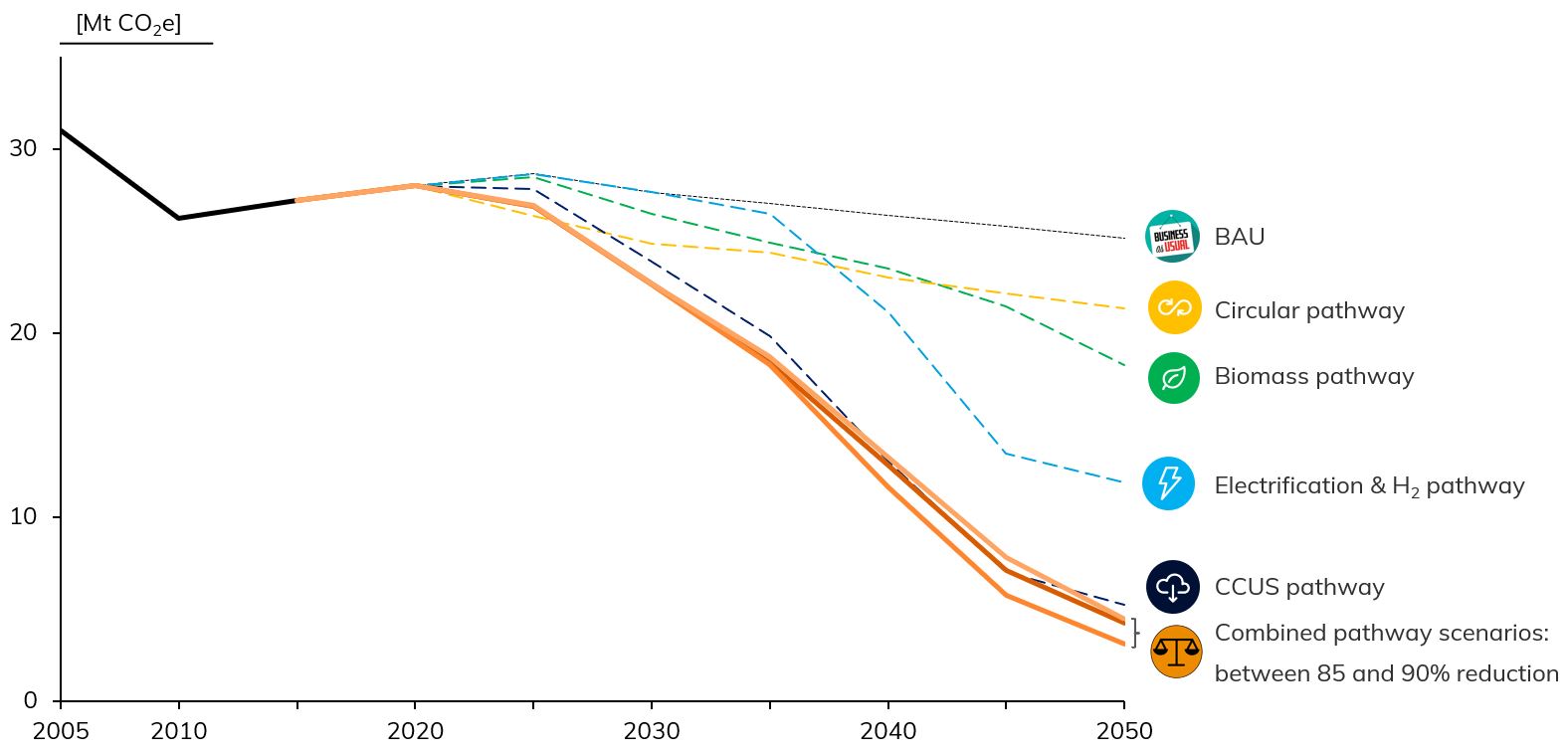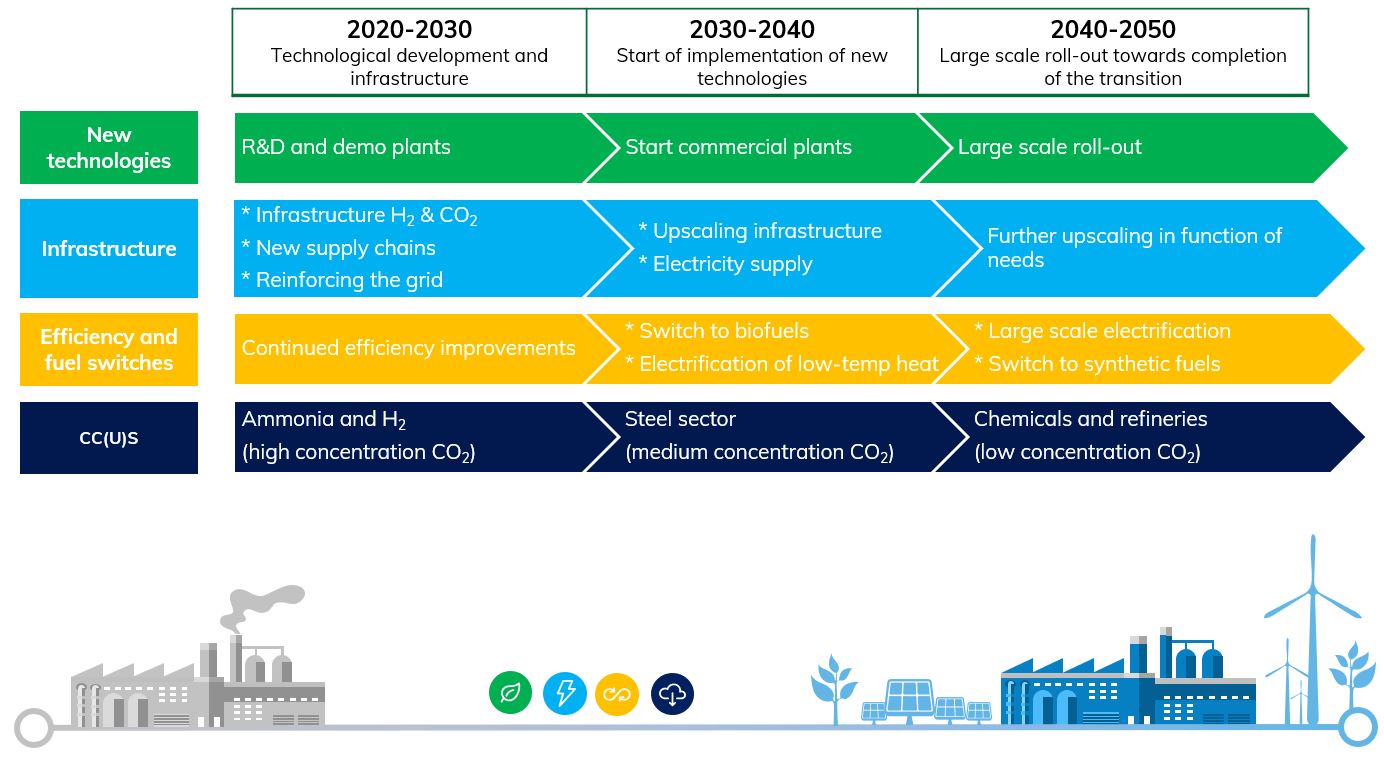A climate roadmap for the Flemish industry
The Flemish energy-intensive industry contributes over 9% to the Flemish GDP. At the same time, it emits over 27 million tonnes of CO2eq. each year, making it the largest source (+-35%) of total Flemish emissions.
How can we transform the Flemish industry, to ensure it can thrive in a climate-neutral Europe by 2050?
To answer this question, the Flemish Agency for Innovation and Entrepreneurship commissioned a study with Deloitte, the VUB-IES, the Antwerp Management School and Climact to assess different reduction options, and to develop a roadmap towards a climate-friendly Flemish industry by 2050. To this end, Climact developed a robust model that includes over 50 different technologies, with a core focus on the chemicals, steel and refinery sectors, which jointly account for +- 90% of industrial emissions. With this model, we assessed the potential of 4 different reduction pathways:

Our analysis showed that we will need a combination of all pathways to meet the challenge ahead of us. Only by combining different pathways, we can achieve deep reductions by 2050 (between 85% and 90% compared to 2005):

Although there are several trajectories towards deep reductions by 2050, we have identified a number of common and recurring elements across different scenarios which can be considered as ‘must haves’ for the transition:
1. Carbon capture will have an important role to play under all scenarios. By 2050, between 10 and 14 million tonnes of CO2 would need to be captured each year. Of this, at least 8 million will have to be transported towards geological storage sites outside of Flanders. We need to start developing the necessary infrastructure for this in the coming decade. While ambitious, we see that several big industrial players are taking concrete steps in this direction, with the ambition to already capture significant amounts of CO2 by 2030 (see e.g. Antwerp@C and the Carbon Connect Delta Programme).
2. Electricity consumption is projected to increase under all scenarios, ranging from +60% to +190%. This calls for a reinforcement of the electricity system and grid in the major industrial clusters, as well as a clear vision on how to ensure sufficient availability of reliant, affordable and climate-neutral electricity
3. The consumption of hydrogen is also projected to increase over all scenarios, reaching between 14 and 26 TWh per year by 2050. The demand increases in particular if the CO2 that is captured is to be re-used;
4. Finally, the demand for biomass and plastic waste is also projected to increase: between 1,5 and 5 million tons of biomass per year and 2,5 million tons of plastic waste per year by 2050. Given the limited availability within Flanders, this requires setting up the appropriate logistics and supply chains.
Based on our analysis, we have developed a Roadmap between now and 2050 with clear steps to be taken in the coming decades to guide the transition:

The transition will be challenging and requires significant and sustained efforts from both public as private actors. However, if successful, it can provide significant opportunities to the Flemish industry and the Flemish society as a whole:
- The Flemish industry can continue to thrive in a climate-neutral EU, generating wealth and jobs
- The transition will create new value chains and develop new export opportunities for Flemish industries and research ecosystems
- By diversifying its feedstock, the Flemish chemicals sector could also become less vulnerable for disruptions the transition might cause in the petroleum sector
- There is significant potential for sectoral coupling and the valorisation of waste streams
- There is a strong synergy with circularity, and the Flemish chemical cluster could make a considerable contribution to the plastic waste problem by re-using waste as a feedstock.
Full reports are available on VLAIO’s website
For more info, contact Pieter-Willem Lemmens (pwl@climact.com)
ShareLatest news & publications
-
Event
Our webinar: transition planning – the role of the board
-
Industry and services
We Supported Lineas in Their Climate Journey
-
Buildings
Accelerating the financing of residential renovations in Belgium
-
News
Introducing our latest tool: the European City Calculator!
-
News
We support BNP in their climate journey
-
News
Bridging the Climate Data Gap: A nuanced approach for Financial Institutions
-
News
Whitepaper: Getting your company ready for Net Zero
-
Industry and services
Navigating Scope 3 Emissions: A Pragmatic Approach with an Impact
-
Event
Replay : Getting your company ready for net zero (webinar 21/06/23)
-
Buildings
Pre-financing energy renovation, an energy-efficient home for every Flemish household
-
News
Reduction strategy: what goal should you aim for by 2030 and 2050?
-
News
How to measure greenhouse gas emissions and what scope to take into account
Get in touch with our experts
{{'NOUS_CONTACTER' | translate}}